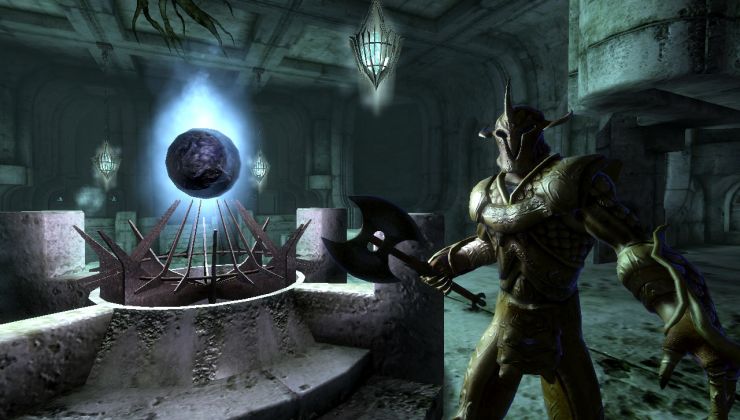Google's game streaming service, Stadia, today adds another 5 titles available for anyone who has an active Stadia Pro subscription to redeem. As promised by Google recently, they continue to expand Stadia and reward those who stick with the Pro tier.
Hitting Stadia Pro today and available right now are:
- Get Packed
- Little Nightmares
- Power Rangers: Battle for the Grid
- SUPERHOT
- Panzer Dragoon: Remake
So right now there's 17 games in total you can access instantly with Stadia Pro. As a reminder of what, here's the current list of Stadia Pro games:
- Destiny 2: The Collection
- GRID
- Get Packed
- Gylt
- Little Nightmares
- PLAYERUNKNOWN’S BATTLEGROUNDS
- Panzer Dragoon: Remake
- Power Rangers: Battle for the Grid
- SUPERHOT
- Serious Sam Collection
- Spitlings
- Stacks on Stacks (on Stacks)
- SteamWorld Dig 2
- SteamWorld Quest: Hand of Gilgamech
- Steamworld Heist
- The Turing Test
- Zombie Army 4
Stadia also has The Elder Scrolls Online on June 16, which will be another free game to claim on Stadia Pro pushing it up to 18. The Elder Scrolls Online will be coming with cross-play with Windows and cross-saves too. That will end up making The Elder Scrolls Online one of the easiest games to play, with it being available on so many platforms across many different devices since it carries your progression.
More games were also confirmed for the Stadia store recently including Metro 2033 Redux and Metro: Last Light Redux. Not surprising, since they already have Metro Exodus up on there.
As an added bit of extra info, it seems the game porter and SDL2 software developer Ryan "Icculus" Gordon was behind the port of Doom 64 to Stadia. As Icculus wrote on Patreon, Stadia already has SDL2 support done by another game porter, Ethan Lee. According to the post, porting was somewhat straightforward too so it seems traditional Linux builds can be very close to what Stadia actually uses (barring Stadia-specific features).
For what's coming next on Stadia, according to 9to5Google who scape updates from the Android package, it seems Google are planning a lot including: a better chat system with party support, trials, demos, free weekends, big sales and more. As expected though, Stadia over-promised initially as noted by Take-Two's CEO and covered by GameSpot, who said pretty clearly it's been slow going.
You can try it out now on Stadia.com. It works on Linux in a Chromium-based browser and you don't need Pro, you can just register and buy a game like other stores (Doom 64 seems cheapest at £3.99). As a final reminder, if you sign up for Pro before June 3, you get 2 months free instead of 1.
Quoting: dubigrasuI'm in agreement with you about most of what you said, but that last point, "If Linux has merits, it will stand on its own" is naive. ChromeOS has the "merit" of a huge corporation with monstrously deep pockets behind it. In our political economy, that is a very, very big "merit". Genuine merits do not magically win out over such.Quoting: LinuxwarperThe only thing I would be concerned with Stadia is the possibility of it being used for ChromeOS.
So the gist of what you said so far (here and elsewhere) is that you're worried and you don't want ChromeOS becoming too competitive with Linux, OK, fair enough. I'm not gonna argue about that (enough arguments on the previous article) but the way I see it, not only Linux will get a competitor, but also Windows will get one. And I somehow doubt that Linux desktop/market share will be the one affected, I see more likely that Windows will go down in that case.
And we're about choices right? If Google's choice is to promote ChromeOS, well, let them.
I'm sure you have other arguments to share, (and boy I'm almost sorry for bringing this up), but I have no desire for ChromeOS to fail so that Linux can succeed. If Linux has merits, it will stand on its own.
Quoting: Purple Library GuyThat wasn't meant in terms of Linux winning a (the) fight against ChromeOS or other entity, but rather Linux continuing to stand or evolve as it did until now. If ChromeOS is going to have a fight, is going to be against Windows (and Apple's products to an extent), while Linux will continue its way, for better or worse.Quoting: dubigrasuI'm in agreement with you about most of what you said, but that last point, "If Linux has merits, it will stand on its own" is naive. ChromeOS has the "merit" of a huge corporation with monstrously deep pockets behind it. In our political economy, that is a very, very big "merit". Genuine merits do not magically win out over such.Quoting: LinuxwarperThe only thing I would be concerned with Stadia is the possibility of it being used for ChromeOS.
So the gist of what you said so far (here and elsewhere) is that you're worried and you don't want ChromeOS becoming too competitive with Linux, OK, fair enough. I'm not gonna argue about that (enough arguments on the previous article) but the way I see it, not only Linux will get a competitor, but also Windows will get one. And I somehow doubt that Linux desktop/market share will be the one affected, I see more likely that Windows will go down in that case.
And we're about choices right? If Google's choice is to promote ChromeOS, well, let them.
I'm sure you have other arguments to share, (and boy I'm almost sorry for bringing this up), but I have no desire for ChromeOS to fail so that Linux can succeed. If Linux has merits, it will stand on its own.
Quoting: dubigrasuAh, I see. Well, as I said, I agree with that much--overall, greater diversity in the desktop OS market is probably good for Linux and good in general, and if the thing increasing the diversity is, basically, Linux itself all the better.Quoting: Purple Library GuyThat wasn't meant in terms of Linux winning a (the) fight against ChromeOS or other entity, but rather Linux continuing to stand or evolve as it did until now. If ChromeOS is going to have a fight, is going to be against Windows (and Apple's products to an extent), while Linux will continue its way, for better or worse.Quoting: dubigrasuI'm in agreement with you about most of what you said, but that last point, "If Linux has merits, it will stand on its own" is naive. ChromeOS has the "merit" of a huge corporation with monstrously deep pockets behind it. In our political economy, that is a very, very big "merit". Genuine merits do not magically win out over such.Quoting: LinuxwarperThe only thing I would be concerned with Stadia is the possibility of it being used for ChromeOS.
So the gist of what you said so far (here and elsewhere) is that you're worried and you don't want ChromeOS becoming too competitive with Linux, OK, fair enough. I'm not gonna argue about that (enough arguments on the previous article) but the way I see it, not only Linux will get a competitor, but also Windows will get one. And I somehow doubt that Linux desktop/market share will be the one affected, I see more likely that Windows will go down in that case.
And we're about choices right? If Google's choice is to promote ChromeOS, well, let them.
I'm sure you have other arguments to share, (and boy I'm almost sorry for bringing this up), but I have no desire for ChromeOS to fail so that Linux can succeed. If Linux has merits, it will stand on its own.
Anyway it'd be weirdly easy to sell ChromeOS users on Linux. "So, you're using Linux already. Wanna try one that doesn't handcuff you?"
Last edited by Purple Library Guy on 2 June 2020 at 7:10 pm UTC
Quoting: dubigrasuAnd we're about choices right? If Google's choice is to promote ChromeOS, well, let them.Where have I said that Google promoting ChromeOS is something I think they should not do, and that I am opposed to them promoting their own product? Rest of your points I don't care for, you lost me between the snarky remarks and "If Linux has merits".
Quoting: LinuxwarperIf I worked for Google I would use Stadia to sell Chromebooks without even blinking.
Quoting: LinuxwarperRest of your points I don't care for, you lost me between the snarky remarks...Ah, sorry to hear that. Apologies for my snarkiness.
Quoting: dubigrasuIIRC we had the same type of arguments when Liam started posting Proton news, the same idea that we should keep Linux news "pure" as in native only news. Luckily we got past that, but I see we're starting all over again with Stadia.I feel it's a bit different. Here's why.
From where I'm standing I think that if we're OK with news about games made for Windows > played locally through Wine, we might as well be OK with news about games made for Linux > played remotely through a browser.
Sure, it doesn't fit in the pure/native/etc category, but the Linux connection is there nevertheless, and is worth posting news about it.
We can directly benefit from Wine / Proton and they directly correspond to being able to take a game and play it through our Linux systems directly.
Stadia is like if we started getting articles on AWS and that we could host our servers there or something.
Granted mine is just an opinion, and if we took a poll to see if other users would like Stadia news, I'd be fine if that's what people voted on. But I'm an adult, and if I don't feel like reading about it, then I'll skip the article. So doesn't really make me angry or anything :)
Quoting: slaapliedjeFor me, a lot of my interest in Linux gaming is strategic. It's less about individual games and more about the future of the platform (and about the implications of Linux gaming for the health of the Linux desktop in general; still waiting for that Year Of The Linux Desktop after all this time).Quoting: dubigrasuIIRC we had the same type of arguments when Liam started posting Proton news, the same idea that we should keep Linux news "pure" as in native only news. Luckily we got past that, but I see we're starting all over again with Stadia.I feel it's a bit different. Here's why.
From where I'm standing I think that if we're OK with news about games made for Windows > played locally through Wine, we might as well be OK with news about games made for Linux > played remotely through a browser.
Sure, it doesn't fit in the pure/native/etc category, but the Linux connection is there nevertheless, and is worth posting news about it.
We can directly benefit from Wine / Proton and they directly correspond to being able to take a game and play it through our Linux systems directly.
Stadia is like if we started getting articles on AWS and that we could host our servers there or something.
Granted mine is just an opinion, and if we took a poll to see if other users would like Stadia news, I'd be fine if that's what people voted on. But I'm an adult, and if I don't feel like reading about it, then I'll skip the article. So doesn't really make me angry or anything :)
So for me, the relevance of Stadia isn't that I'm interested in playing games on it, or even interested in Linux gamers in general playing games on it. The relevance is that one way or another, its existence has an impact on how viable gaming on Linux in general will be. For instance, even though I absolutely hate this notion, if Stadia were to take over all gaming and become a monopoly . . . then Linux would be an absolutely equal gaming platform, all games would be written for Linux, DirectX would die out, all graphics tools would treat Linux as the primary target. And, we'd all be renting our games on Google's sufferance.
That would be pretty big news for Linux gaming, surely.







See more from me